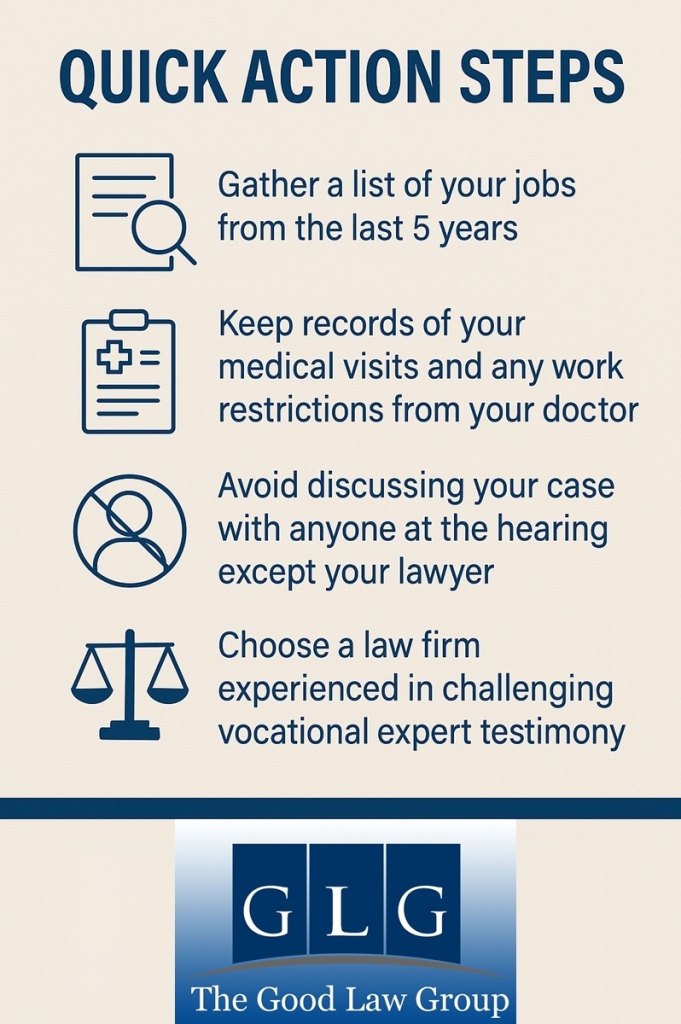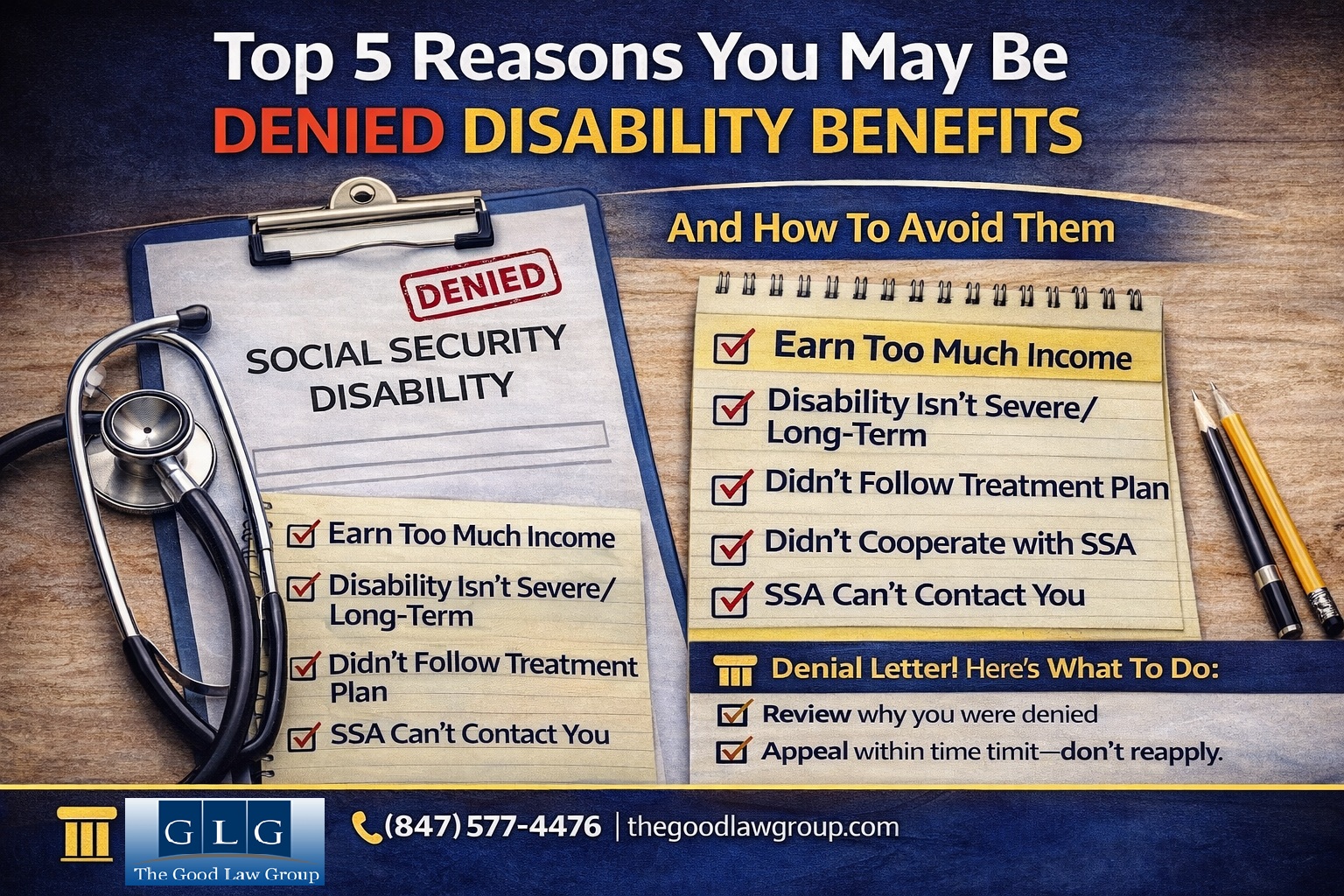What happens if a vocational expert says you can still work, even when you can’t? That testimony can carry significant weight in an SSDI hearing and might hurt your chances of approval. Today, I’ll break down how vocational experts affect your SSDI hearing cases and why their role deserves your full attention. I’ll cover how your job history is classified, what residual functional capacity means, and how outdated job definitions can be challenged. Learn more in this video.

If you’re one of many people applying for Social Security Disability Insurance (SSDI), you’ve probably heard how hard it can be to get approved. One part of the hearing process that often catches people off guard is the role of the vocational expert (VE). These experts don’t work for you. They don’t work for the judge either. But their opinion can carry a lot of weight in whether your disability claim is approved.
When it comes to Social Security Disability (SSDI) hearings, vocational experts play a critical role. These individuals are present in nearly every hearing I’ve participated in, and their input can influence the outcome of a case. They’re often referred to as vocational witnesses, and they provide testimony on whether a person can still perform their past work or any other work based on their current limitations. Understanding how they operate and what they base their answers on can make a significant difference in how your case is handled.
What Is a Vocational Expert?
A vocational expert is someone the Social Security Administration brings in to testify about what kind of work you can still do, if any, based on your current limitations.
Their job is to give opinions like:
“Can this person still do the job they used to do?”
“Are there any jobs they could do with their current limitations?”
The answers are based on your medical restrictions, the type of work you’ve done before, and how those two things match up.
What does a vocational expert do at an SSDI hearing?
A vocational expert (VE) at an SSDI hearing provides testimony about whether a claimant can still perform their previous work or any other jobs based on their medical limitations. The VE classifies past work using the Dictionary of Occupational Titles and responds to hypothetical questions from the judge or attorney about the claimant’s ability to work. Their opinion plays a key role in the approval or denial of disability benefits.
How Vocational Experts Classify Your Past Work (And Why It Matters)
The VE uses a government database called the Dictionary of Occupational Titles (DOT) to classify your past jobs. This includes:
• Physical demands of your job (sedentary, light, medium, heavy)
• Skill level and how long it takes to learn the job (called SVP level)
But the DOT hasn’t been updated in decades. A lot of job descriptions are out of touch with today’s work environment. That means VEs often make judgment calls or update things on the fly, which may not be accurate. If your attorney doesn’t catch these inconsistencies, the outcome of your hearing could be unfairly impacted.
New SSDI Rules in 2025: Why They May Actually Help You
One of the first things a vocational expert does is classify your past relevant work. As of 2025, the definition of past relevant work has changed. Instead of looking back over the last 15 years, they now consider only the past five years of full-time employment. This shorter timeframe is actually beneficial to claimants because it limits the range of jobs that can be considered.
What Is Residual Functional Capacity (RFC) and How Is It Used Against You?
After classifying your work history, the vocational expert responds to questions about your residual functional capacity. This is a legal term that refers to the most work you can still perform in spite of your limitations. These limitations are described through a series of hypotheticals presented by the judge or your attorney.
For example, they may ask the expert whether someone who can only occasionally use their hands, cannot stoop or kneel, and needs regular breaks, could still perform their previous job or do any other work. The expert’s answers help determine if there are jobs you can still do, given your limitations, age, and any transferable skills from your past work.
Vocational experts are influential in hearings, so it’s essential to have an attorney who knows how to question their testimony effectively. Their statements can either support or hurt your claim.
That’s why it’s critical to have an attorney who knows how to:
• Frame those hypotheticals accurately
• Cross-examine the vocational expert
• Argue when a job suggestion isn’t realistic
Knowing how to interpret SVP levels, physical demands, and how your age factors into the equation is not something you want to leave to chance. A knowledgeable attorney can make sure the vocational expert’s responses are accurate and fair.
Why You Shouldn’t Go Through a Hearing Alone
If you’re already feeling overwhelmed, you’re not alone. SSDI hearings are complex, and vocational expert testimony can easily sway the decision – unless someone is there to stand up for you.
That’s what we do every day at The Good Law Group.
• We know how to challenge outdated job descriptions.
• We understand how to expose gaps in vocational testimony.
• And we fight for real people, not statistics.
You deserve to be heard. You deserve to be taken seriously. And you deserve a legal team that knows how to make that happen.
✅ Quick Action Steps
• Gather a list of your jobs from the last 5 years
• Keep records of your medical visits and any work restrictions from your doctor
• Avoid discussing your case with anyone at the hearing except your lawyer
• Choose a law firm experienced in challenging vocational expert testimony

💬 Get Help Today
If you’ve been denied SSDI or are preparing for your hearing – don’t go it alone.
📞 Call us at (800) 419-7606
🌐 Or visit thegoodlawgroup.com to schedule your free consultation.
You only pay if we win your case. Let’s fight for the benefits you’ve earned.









